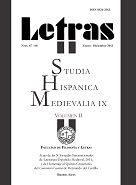Desde El libro del acedrex alfonsí hasta el Ludus sacc(h)orum de Jacopo de Cessolis : la circulación de un tópico
Keywords:
Chess, Imago Mundi, Hierarchical Society, Morality Tales, MobilityAbstract
In this paper we try to explain -from a pragmatic approach- the topic of chess as an imago mundi in two books: the Wise King’s Libro de los juegos, or Libro del ajedrez, dados y tablas (composed between 1251 y 1283) and Jacopo De Cessolis’s Ludus Sacc(h)orum o Juego de Ajedrez (1300-1330) in its first Spanish translation by Licenciado Reyna (1549). In the translation of Oriental texts Alfonso X’s strategy is both literal and interpretative: literal regarding the didactic aspects and interpretative of the symbolic contents in an attempt to legitimate the hierarchical society in which he represents the head. Thus chess as an imago mundi is central in the conception of order designed in his legal, historical and scientific works. On the other hand, both De Cessolis’s text and Reyna’s translation belong to the medieval tradition of “moralized chess”: there is a constant flow of moralizing exempla, in which every piece of the game is associated to a class or profession, whereas the world is represented as a “human struggle” for mobility in the structured society of the thirteenth century.Downloads
Download data is not yet available.
Downloads
Published
2019-04-23
How to Cite
Ferrero, G. (2019). Desde El libro del acedrex alfonsí hasta el Ludus sacc(h)orum de Jacopo de Cessolis : la circulación de un tópico. Letras, (67-68), 65–76. Retrieved from https://e-revistas.uca.edu.ar/index.php/LET/article/view/1793
Issue
Section
Ponencias
License












